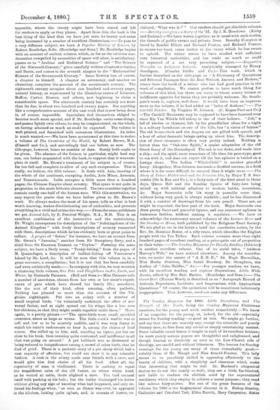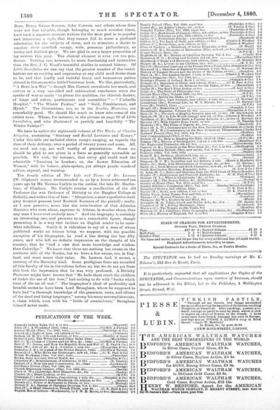The Sunday Maga:ine for 1880. Little Snowflakes, and The Strength
of Her Youth, being the Sunday Magazine Christmas numbers, for the young and adult readers respectively.—We know of no magazine for the young, or, indeed, for the old—especially meant for Sunday reading—so good as this. We might go further, and say that there arc scarcely any, except the scientific and purely literary ones, so free from any trivial or simply entertaining matter. Some valuable moral lesson is taught in each of its excellent fictions; its more purely serious papers are thoughtful and enlightened, and though leaning as distinctly as over to the Low-Church side of theology, are candid and without bitterness. The lessons for Sunday evenings for the young are many of them remarkably good,— notably those of Mr. Waugh and Miss Arnold-Forster. This lady seems to us peculiarly skilled in appealing effectively to the hearts of children, with a simplicity and Weariless which make that interesting that might be dull. Dr. Macleod's allegorical stories we do not like nearly so well ; they are a little far-fetched, and liable to confuse the childish mind by the supernatural machinery which they employ to achieve a moral purpose ; they read like solemn fairy-stories. But one of the great features of the volume for 1880 is the biographical element in it. Bishop Stanley, Catherine and Craufcrrd Tait, Elihu Barritt, Mary Carpenter, Sister Dora, Henry Nairne Dowson, John Cameo, and others whose lives were not less valuable, though belonging to much remoter times, have each a separate memoir, written for the most part in so popular and interesting a style, that they cannot fail to rouse a profound admiration for the subjects of them, and to stimulate a desire to emulate their unselfish energy, wide, generous philanthropy, or loving and faithful piety. We are glad to see a larger proportion of lay writers this year. The clerical element is even yet too pon- derous. Nothing can, however, be more fascinating and instructive than the Rev. J. G. Wood's beautiful studies in natural history. Of Little Snowflakes we can say that the greater number of the contri- butions are as exciting and engrossing as any child need desire them to be, and that kindly and tasteful fancy and humourous pathos abound in this attractive little Christmas book. We like, particularly, 4' A Hero in a War "—though Mrs. Garnett overshoots her mark, and arrives at a very one-sided and unhistorical conclusion when she speaks of war as made to please the ambition, the thievish desires, of kings and rulers, parliaments and assemblies — " Umbrella Hospital," "The Winter Fairies," and "Gold, Frankincense, and Myrrh." The illustrations, too, as in the Sunday Magazine, are remarkably good. We should like much to know who some of the artists were. Whose, for instance, is the picture on page 19 of Little Snowflakes, and who illustrated so prettily and fancifully "The Winter Fairies P"







































 Previous page
Previous page